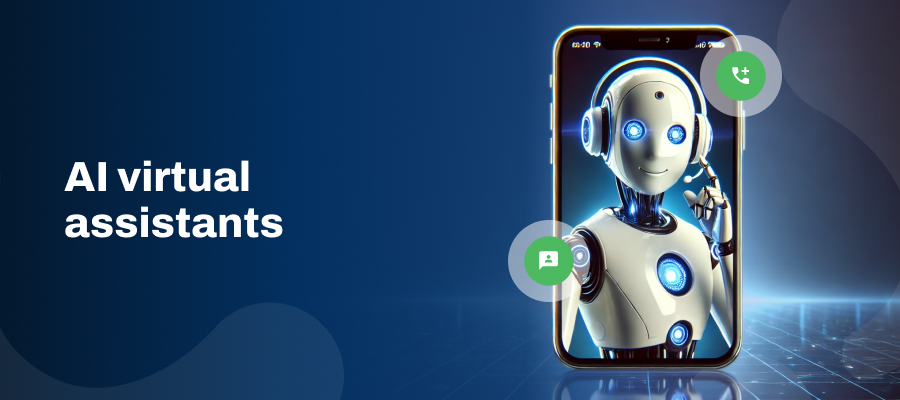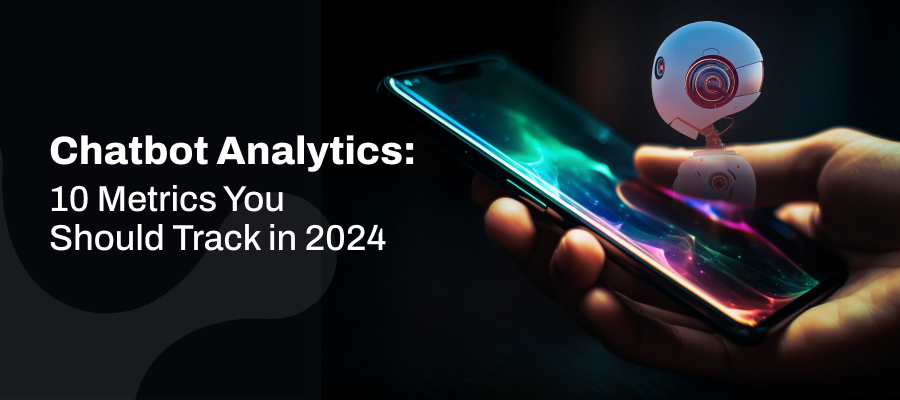When we talk about AI virtual assistants, we think of smart home devices like Siri and Alexa. However, AI assistants have integrated their way well into commercial sectors like contact centers and sales.
In this blog post, we cover the benefits of AI assistants across industries and also directions on choosing the right platform for your business.
What is an AI Virtual Assistant?
An AI virtual assistant is a tool that understands and responds to text and/or voice-based human queries. It uses natural language processing (NLP), speech analysis, sentiment analysis, and other deep technologies to analyze questions and generate human-like responses using training data.
In contact centers, virtual assistants can perform routine tasks like answering common questions, providing general information and scheduling calls. It helps free up agents’ time while improving customer experience by offering 24×7 support.
How Does an AI Virtual Assistant Work?
AI virtual assistants use natural language processing (NLP), speech-to-text (STT), and text-to-speech (TTS) engines to interpret, process, and respond to user input. Here’s how these components work together:
Step 1. User Input
The process begins when a customer starts an interactation with the tool. It could be a text or voice input; for example, asking “What’s the temperature today in Mumbai?” to a smart speaker.
For voice interactions, the speech-to-text (STT) converts the voice data into text, which is then processed by the system.
Step 2. Input Processing
The assistant analyzes the input phrases by using natural language processing (NLP) to understand the terms, entities, and intent.
For example, the NLP identifies key entities (i.e., Mumbai as place or city) and understands the intent (i.e., retrieving weather information) from the voice input like.
This allows the assistant to interpret the query’s meaning and take appropriate action.
Step 3: Determining the Next Course of Action
Based on the query intent, the AI model generates the next action step.
It could be a simple text-based response based on the model’s knowledge or actions like performing API calls and retrieving information from the database. In our example, the AI assistant, if trained, calls a relevant API call to get the weather information.
Step 4. Generating Response
Finally, the response is generated from the collected data in a readable format. In the case of voice-based assistants, the tool converts the text into speech using text-to-speech (TTS) engines.
On top of this, AI virtual assistants also actively learn from their interactions and get better with time.
Key Features of AI Virtual Assistant
Here are some features virtual assistants use to deliver context-aware responses and efficient communication:
» Task Automation
AI assistants can automate repetitive tasks like answering FAQs, managing simple inquiries, and scheduling calls/emails. It can automate time-consuming tasks, lower human dependency, and reduce errors.
» Natural Language Processing (NLP)
AI virtual assistants can use NLP to analyze and interpret users’ intent and generate appropriate responses in a natural language. It helps the tool understand complex queries regardless of spelling errors or phrasing and creates a human-like interaction.
» Machine Learning
AI virtual assistants can learn on the go from past interactions and adapt to user preferences and behavior over time. This enhances the tool’s ability to provide accurate and meaningful responses for each customer.
» Voice recognition
Voice-based virtual assistants use voice recognition technology to understand commands and respond verbally. This makes the tool more accessible and convenient for a hands-free experience. Additionally, the feature allows the tool to personalize the communication style by using various languages, accents, and speech patterns.
» Personalization & Adaptability
AI assistants adapt to user preferences, tailoring conversations based on past interactions. It also modifies the language and tone to the user’s communication style.
» Multilingual Support
Many advanced virtual assistants are equipped with multilingual capabilities, allowing the tool to handle interactions in multiple languages. This feature allows businesses to broaden usability globally.
Exotel is an AI-powered communication platform that offers advanced GenAI voice assistants for enhanced and personalized customer engagement. It can deliver accurate and human-like conversations with its speech recognition, semantic search, noise cancellation, and more capabilities.
Benefits of AI Virtual Assistants for Businesses
An AI virtual assistant enhances business operations and customer experience. Here are some benefits of adopting them.
» Increased Customer Autonomy
AI assistants empower customers to resolve their queries independently and at their own convenience. The tools help assess information and troubleshoot problems instantly without human assistance.
» Implementing Customer-first Approach
Customers prefer a brand that values their time. AI virtual assistants allow businesses to become customer-first by prioritizing customer’s need to receive personalized and on-demand support anytime and anywhere.
» 24×7 Availability
Unlike human agents, AI assistants can provide consistent customer service without any time off. They can operate globally and across different time zones, ensuring customers receive timely responses every single time.
» Increased Operational Efficiency
AI virtual assistants can handle routine tasks like scheduling meetings, answering FAQs, or processing basic customer requisitions. Automating tasks that don’t require human intervention reduces wait times and allows agents to focus on high-priority activities.
» Cost-effective
In industries like customer service or tech support, adopting AI assistants helps automate routine operations, reducing the need for a larger team. As the tool can resolve many basic queries, it reduces the reliance on human agents, resulting in cost savings.
Additionally, the system scales as per demand, meaning businesses don’t need to hire agents for peak seasons. Beyond this, it also saves operational overhead by reducing resource utilization and errors.
Use Cases of AI Virtual Assistant in Different Industries
Let’s look at how various industries can utilize AI assistants in their operations.
1.Healthcare
AI virtual assistants can automate tasks like scheduling appointments, sending check-up reminders, and giving information about doctor’s availability. This can help improve the quality of patient care and operational efficiency at the same time.
2.Banking & Finance
The virtual assistant in banking and financial services helps streamline operations and provide personalized customer services. It can manage tasks like helping users with basic account management and complex financial planning. One of the most common applications of AI assistants is helping users check their balances and review transaction history.
3.E-commerce
Online shopping sites can use AI virtual assistants to make customer support more efficient. It can help customers with basic queries regarding their orders like tracking, raising a return or replacement request, and answering common queries.
4.Travel
Travel industry can simplify trip planning by assisting travelers with booking flights, hotels, and rental cars from a unified website. They can provide real-time updates on flight statuses and even recommend activities based on traveler’s itineraries and preferences.
Factors to Consider When Looking for an AI Virtual Assistant
Here are a few factors you should keep in mind when choosing the right AI assistant solution.
- Integrations – The system should integrate well with your existing tech stack (for e.g., CRM) and generate responses using your business knowledge. For e.g., retriving customer data from your existing CRM solution.
- Customizability – The AI assistant should be flexible and adaptable to your business needs to personalize responses and workflows. For e.g., customizing the assistant to prioritize certian customer interactions like order returning or delays in deliveries.
- Industry-specific Features – Choose an assistant that offers functionalities specific to your country. For e.g., an e-commerce brand can go with a solution built with more features for online stores
- Data security & compliance – AI virtual assistants often handle sensitive customer details like financial data, addresses, and emails. To avoid any data breach, ensure that the tool you choose adheres to the industry standard of data privacy and security.
Key Takeaways
AI virtual assistants can help businesses transform operations, drive efficiency, enhance customer interactions, and empower human agents. This helps deliver a consistent, personalized, and efficient support 24×7 without worrying about downtime.
Businesses can use AI assistants to enhance customer experience through self-service options, personalized experiences, and quick responses.
Exotel is an AI-powered communication platform revolutionizing customer interactions. Its Gen-AI-driven virtual assistants seamlessly integrates into your contact center, delivering real-time, multilingual, and human-like conversations. The intelligent voicebots provide uninterrupted support 24×7, enhancing business efficiency and customer satisfaction. Request a demo today to enhance customer interactions.
FAQs
Are AI Virtual Assistants and Chatbots the same?
AI virtual assistants are designed to handle both text and voice-based interactions across multiple channels. While chatbots address text-based queries on websites or apps.
What is the Difference Between an AI Virtual Assistant & Conversational AI?
An AI assistant is an application of conversational AI and it is designed to perform tasks like setting reminders, scheduling calls, and answering customer questions. On the contrary, conversational AI enables natural language interactions across tools like chatbots, voicebots, and virtual assistants.
What Are Some Examples of AI Virtual Assistants?
Amazon Alexa, Google Assistant, and Apple Siri are some of the widely-used AI virtual assistants.
 +91-808 8919 888
+91-808 8919 888 +91-808 8919 888
+91-808 8919 888 +966 135 181 912
+966 135 181 912




